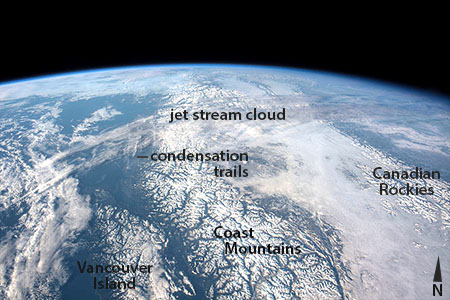
 Photo #: ISS046-E-3699 Date: Dec. 2015
Photo #: ISS046-E-3699 Date: Dec. 2015Geographic Region: CANADA-BC
Feature: PAN-COAST MTS., VANCOUVER I., JET STREAM CLOUDS

 Photo #: ISS046-E-3699 Date: Dec. 2015 Photo #: ISS046-E-3699 Date: Dec. 2015Geographic Region: CANADA-BC Feature: PAN-COAST MTS., VANCOUVER I., JET STREAM CLOUDS |
 |
| Coast Mountains and Polar Jet--Canada panorama Orbiting over the Gulf of Alaska towards the west coast of the US, an astronaut aboard the International Space Station took this panorama looking north toward the snow-covered landscape of Canada's Coast Mountains (image center), the Canadian Rockies (far right) and Vancouver Island (lower left). Brilliant snow and ice caps on the mountain crests, even in the low light of a northern winter, contrast with the network of dark valleys, in shadow or below the snow line. These deep valleys were enlarged by eroding glaciers repeatedly in the ice ages (the last 2-3 million years). A long cloud band slants across the entire image. Meteorologists think this may be the remnants of a jet stream cloud band. These cloud bands indicate the general position of fast winds--"rivers of air" that can reach speeds of more than 275 mph (239 kts / 442 kp/h). This specific band is the typical position and orientation of the Animated maps of the Polar Jet, for the days before this image, show a dying branch of the jet over western Canada. Even in this distant view several thin contrails disrupt the cloud band where aircraft were flying near the jet stream. Aircraft often take advantage of these fast jets as tail winds to shorten flight times--when flying in the same direction as the jet stream (west to east). Images taken just before and just after this image show changing view angles of the jet stream cloud (ISS046-E-3678 to ISS046-E-3707), giving the sense of the astronaut experience of flying across the planet. An arc of lower-level cloud is a cold front approaching Vancouver Island (far left side of image). |
| Images: | All Available Images Low-Resolution 82k |
|
| Mission: | ISS046 |
|
| Roll - Frame: | E - 3699 |
|
| Geographical Name: | CANADA-BC |
|
| Features: | PAN-COAST MTS., VANCOUVER I., JET STREAM CLOUDS |
|
| Center Lat x Lon: | 52.5N x 124.5W |
|
| Film Exposure: | N=Normal exposure, U=Under exposed, O=Over exposed, F=out of Focus |
|
| Percentage of Cloud Cover-CLDP: | 25 |
|
| Camera:: | N6 |
|
| Camera Tilt: | HO | LO=Low Oblique, HO=High Oblique, NV=Near Vertical |
| Camera Focal Length: | 28 |
|
| Nadir to Photo Center Direction: | NW | The direction from the nadir to the center point, N=North, S=South, E=East, W=West |
| Stereo?: | Y=Yes there is an adjacent picture of the same area, N=No there isn't |
|
| Orbit Number: | |
|
| Date: | 20151229 | YYYYMMDD |
| Time: | 221418 | GMT HHMMSS |
| Nadir Lat: | 46.8N |
Latitude of suborbital point of spacecraft |
| Nadir Lon: | 121.3W |
Longitude of suborbital point of spacecraft |
| Sun Azimuth: | 210 | Clockwise angle in degrees from north to the sun measured at the nadir point |
| Space Craft Altitude: | 215 | nautical miles |
| Sun Elevation: | 15 | Angle in degrees between the horizon and the sun, measured at the nadir point |
| Land Views: | COAST, ISLAND, MOUNTAIN |
|
| Water Views: | BAY, FRONT, GULF, ICE |
|
| Atmosphere Views: | JET STREAM |
|
| Man Made Views: | |
|
| City Views: | VANCOUVER |
|
Photo is not associated with any sequences | ||
| NASA Home Page |
JSC Home Page |
JSC Digital Image Collection |
Earth Science & Remote Sensing |
|
|